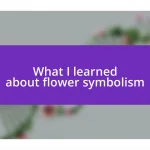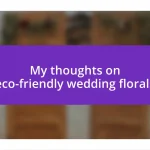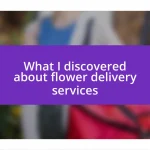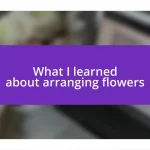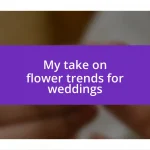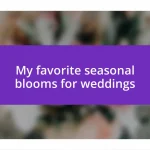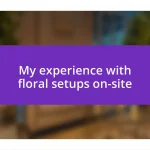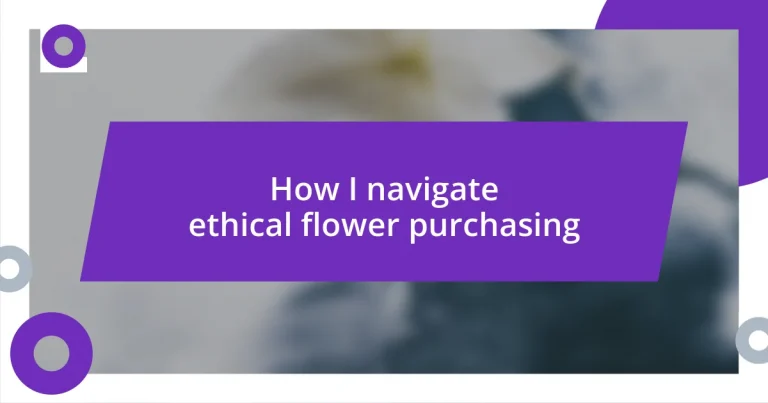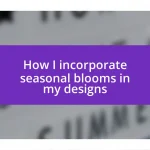Key takeaways:
- Choosing ethically sourced flowers supports sustainable farming practices, fair labor, and community well-being.
- Certifications like Fair Trade and organic labels ensure ethical production, but it’s important to research their credibility.
- Engaging with local flower markets and growers enriches the purchasing experience and fosters environmental responsibility.
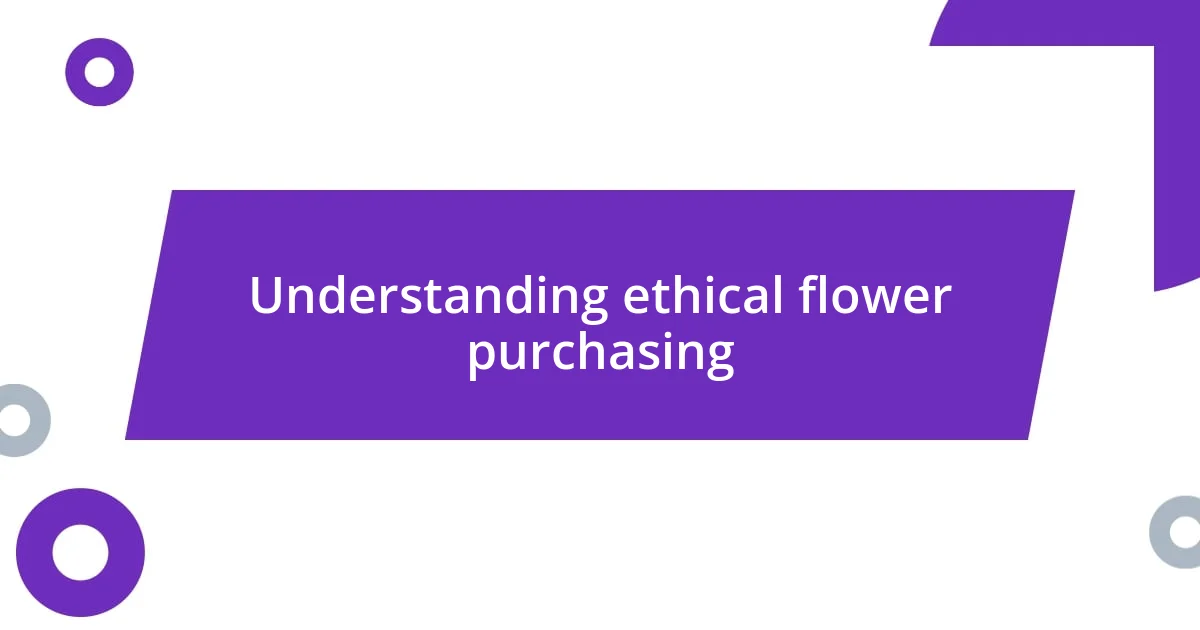
Understanding ethical flower purchasing
When I think about ethical flower purchasing, I immediately reflect on the journey those blooms take to reach my vase. It’s not just about the end product; it’s about considering the entire supply chain. Have you ever wondered what goes into growing and harvesting those beautiful flowers?
I remember a trip to a local farmer’s market where I spoke to a florist who sourced her flowers sustainably. She shared stories about her relationships with growers who prioritize fair wages and environmental stewardship. It was eye-opening to realize how much impact we can have by choosing local and sustainable options. It made me feel more connected to my purchases, turning something simple into a meaningful choice.
Understanding ethical flower purchasing also means recognizing the importance of certifications. These labels, like Fair Trade or Rainforest Alliance, signify methods that care for both the planet and people. Next time you’re at a shop, try asking about these certifications. It feels good to know your flowers are supporting a better world while still brightening your home.
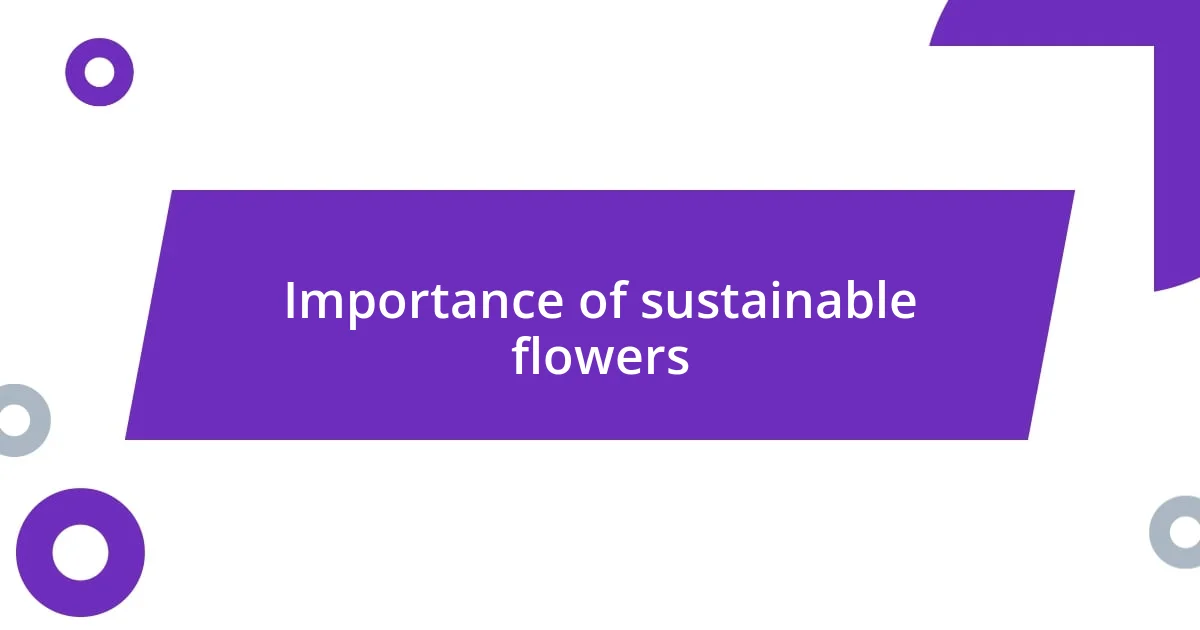
Importance of sustainable flowers
Sustainable flowers hold immense significance for both our planet and communities. When I began to explore the world of sustainable floristry, I was astounded by the positive effects – from reduced carbon footprints to enhanced biodiversity. Flowers grown with sustainable practices promote healthy ecosystems, allowing local wildlife to thrive. Imagine walking through a garden buzzing with life! It’s a stark reminder of how our choices can nurture nature instead of depleting it.
Moreover, opting for sustainably sourced flowers often means supporting fair labor practices, which really touched my heart. I recall purchasing a bouquet from a shop that sourced its blooms from a cooperative of local farmers. Hearing how these farmers invest in their communities and provide fair wages made me appreciate the beauty of my flowers even more. Every time I catch a whiff of that bouquet, it reminds me of the vibrant lives and stories behind each stem.
It’s essential to recognize that sustainable flowers not only benefit the environment and communities; they also contribute to our personal well-being. I find that surrounding myself with flowers that support ethical practices brings me a sense of peace and fulfillment. Knowing that my choices align with my values creates a ripple effect of joy, both in my home and the world at large.
| Aspect | Sustainable Flowers |
|---|---|
| Environmental Impact | Supports biodiversity and reduces carbon footprint |
| Community Support | Helps local farmers by providing fair wages and resources |
| Personal Well-Being | Enhances emotional connection and sense of fulfillment |
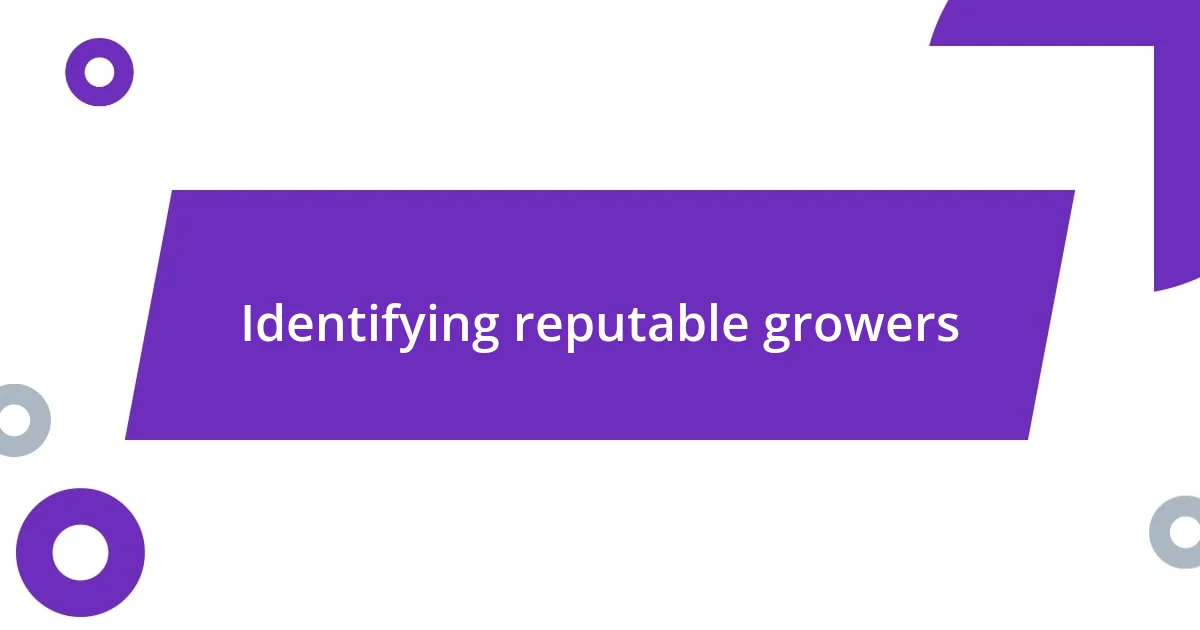
Identifying reputable growers
Identifying reputable growers is fundamental to ensuring that our flower purchases make a positive impact. I’ve made it a habit to research growers before I buy. Visiting their websites often gives me a glimpse into their farming practices, values, and the communities they support. I once stumbled upon a grower who not only practiced organic farming but also invested in local education systems, which truly touched my heart and encouraged me to spread the word about their flowers.
To help you in identifying reputable growers, consider these points:
- Transparency: Look for growers who openly share their farming methods and sourcing practices.
- Certifications: Check for recognized labels like Fair Trade or organic, which signify ethical practices.
- Community Engagement: Seek out growers involved in their local communities, contributing to social projects or fair labor.
- Sustainable Practices: Prioritize those who use environmentally friendly techniques, such as water conservation and biodiversity cultivation.
- Personal Connection: Engage with growers through farmer’s markets or local events; a genuine conversation can reveal a lot about their passion and commitment.
These criteria not only guide my purchasing decisions but also create a deeper connection to the flowers I choose.
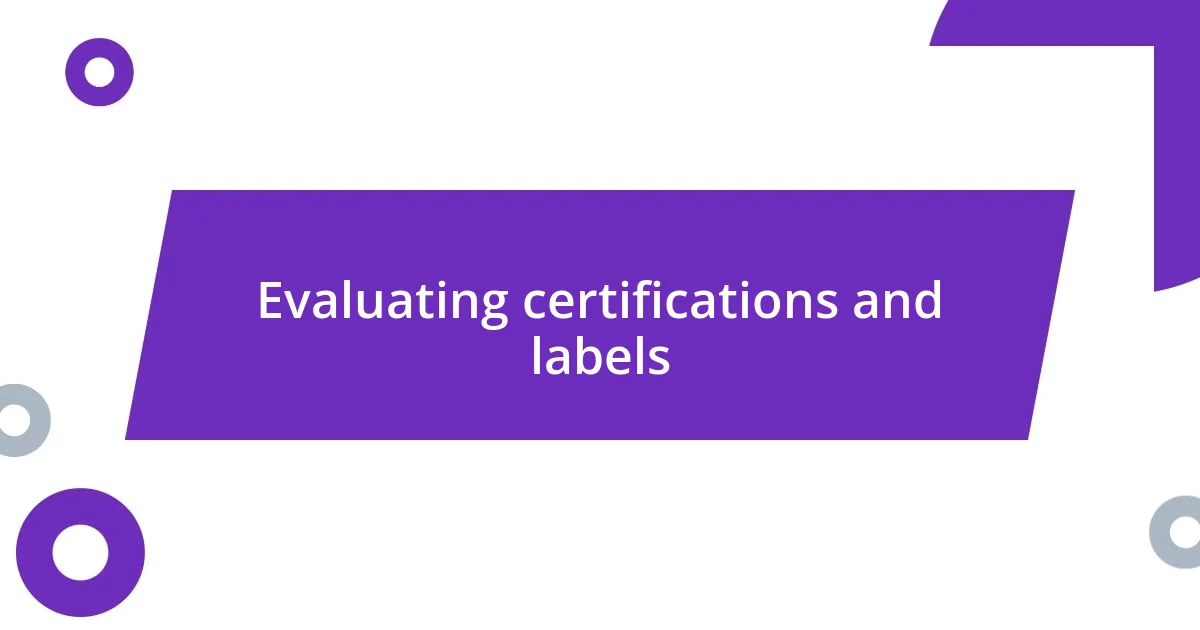
Evaluating certifications and labels
Evaluating certifications and labels is a crucial step in navigating ethical flower purchasing. I can’t emphasize enough how helpful these certifications can be, acting as a beacon for consumers like us. When I first encountered the Fair Trade label on a bouquet, it sparked my curiosity — I wanted to know more about what it meant for the farmers behind those blooms. This label reassured me that these flowers weren’t just beautiful; they were grown under fair labor practices that truly uplift the people involved in their production.
As I delved deeper into the world of floral certifications, I discovered that organic labels also played an essential role. These flowers are produced without synthetic fertilizers and pesticides, which I learned can be harmful not just to our environment but also to the well-being of farm workers. I remember the moment I picked out an organic arrangement and felt a sense of pride knowing my choice supported healthier ecosystems. It’s fascinating how these labels can provide that extra layer of assurance, isn’t it?
However, I’ve realized that not all certifications are created equal. Some might sound impressive but lack rigorous standards. I’ve often found myself questioning the authenticity of labels when I see them on products. Engaging with local growers about their practices often uncovers the real story behind the flowers. Trusting my instincts and making an effort to educate myself about these certifications has made my journey in ethical flower purchasing so much richer. Have you ever wondered how many stories lie behind the labels you’re choosing? Understanding the certifications allows us to appreciate those stories and the efforts that go into bringing beauty into our lives.
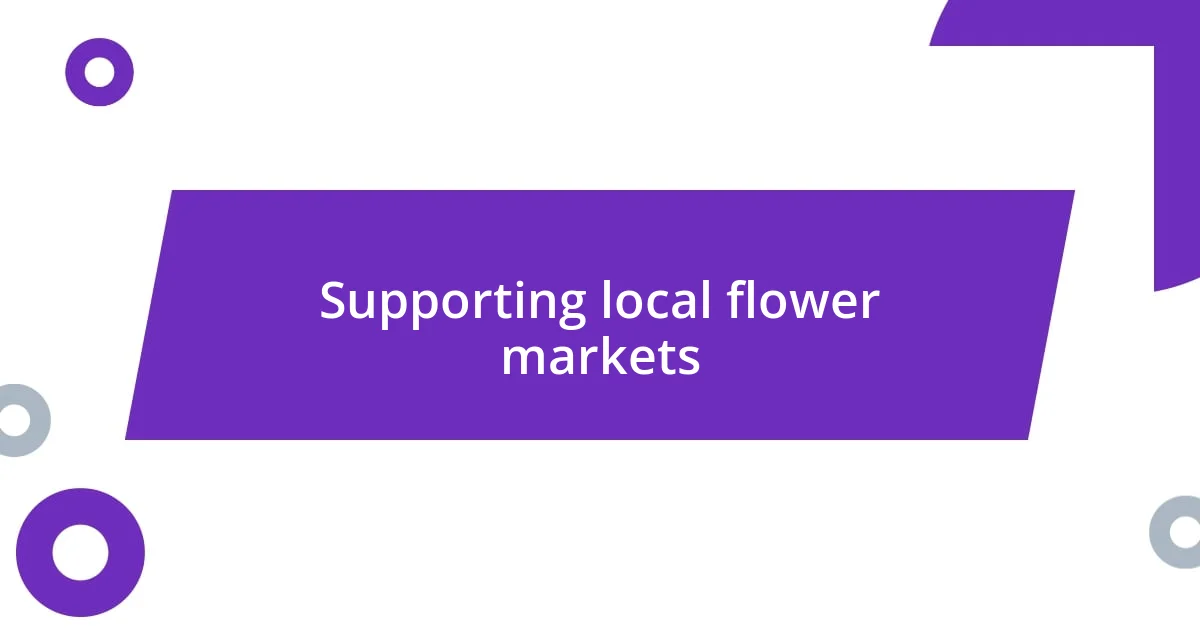
Supporting local flower markets
Supporting local flower markets is an incredible way to connect with my community while making ethical choices. I remember the first time I visited a small flower stand downtown—it was bursting with vibrant colors and pleasant fragrances. Speaking directly with the vendor about how they sourced their flowers created a bond; I felt like I was part of a broader story, one that supported local economies and reflected the unique character of my neighborhood.
I also find that buying from local markets allows me to choose flowers that are in season, resulting in fresher blooms that last longer. Recently, I purchased a stunning arrangement of dahlias, knowing they were grown just a few miles away. Not only did they brighten my home, but I felt a rush of satisfaction knowing that my purchase directly benefited a local farmer’s passion and hard work. Can you imagine the difference we can make when we prioritize local options in our flower purchasing?
Furthermore, these local markets often have a rich tapestry of seasonal offerings, allowing me to explore different varieties throughout the year. I once attended a spring flower festival that introduced me to flowers I had never seen before. It was exhilarating to learn about their unique care requirements and origin stories right from the growers themselves. It struck me how each bloom had its place in our environment while reinforcing my commitment to nurturing local agricultural practices. Why not take a step into your local flower market and see what treasures await? You might discover not just flowers, but also the stories and passion of those who cultivate them.
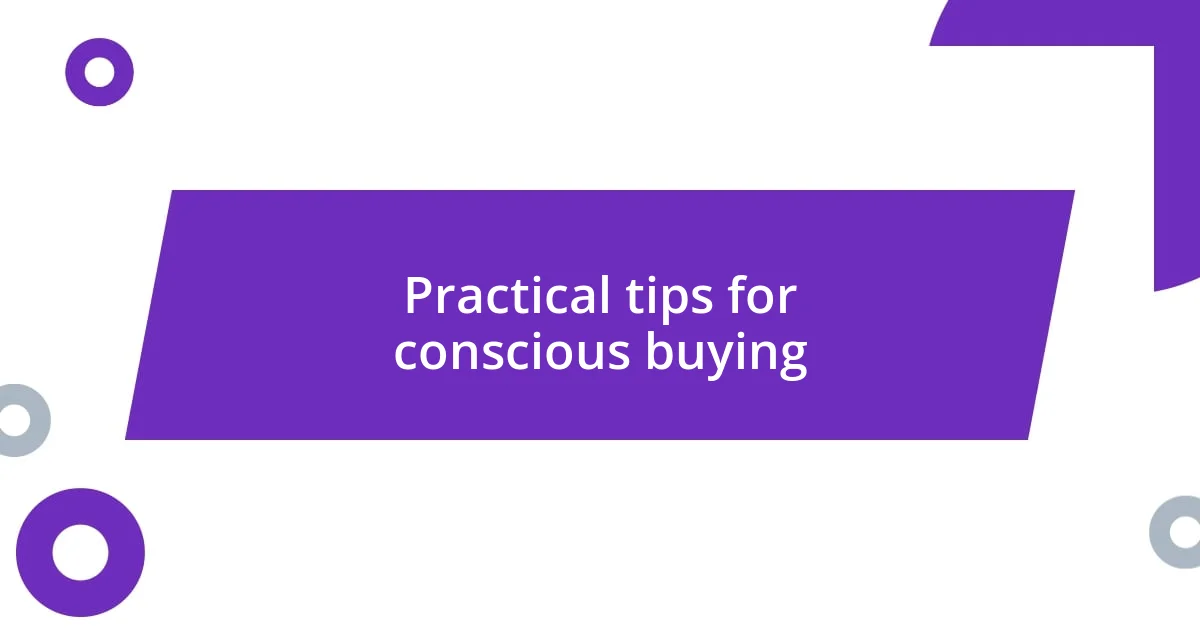
Practical tips for conscious buying
Choosing the right flowers can feel overwhelming at times, but I’ve found that setting a budget helps me focus on quality over quantity. Recently, I set aside a specific amount for my floral arrangements, which encouraged me to explore more meaningful selections. Have you ever noticed how a well-chosen bouquet can evoke a deeper emotional response? Investing in a few beautiful, ethically sourced stems brings me joy and enhances my space far more than a larger, less intentional display ever could.
Another strategy I employ is researching the growers before making a purchase. I recall a delightful afternoon spent perusing a website that showcased local farms and their sustainable practices. It sparked a real connection for me as I recognized the faces behind the flowers. Whenever I find myself puzzled about where to buy, I remind myself that behind each bouquet lies a story worth discovering. I know that engaging with these growers gives my purchases meaning and contributes to a more sustainable flower industry.
Don’t overlook the importance of asking questions when you’re in a shop or at a market. I once approached a florist with a few inquiries about the origins of a specific arrangement. To my surprise, the more we chatted, the more insight I gained into the hard work and dedication that goes into flower production. That conversation not only informed my buying choices but deepened my appreciation for the artistry of floral design. I often wonder—how many stories and hidden treasures can we uncover simply by asking the right questions? I encourage you to engage and explore; it makes the experience all the more rewarding.
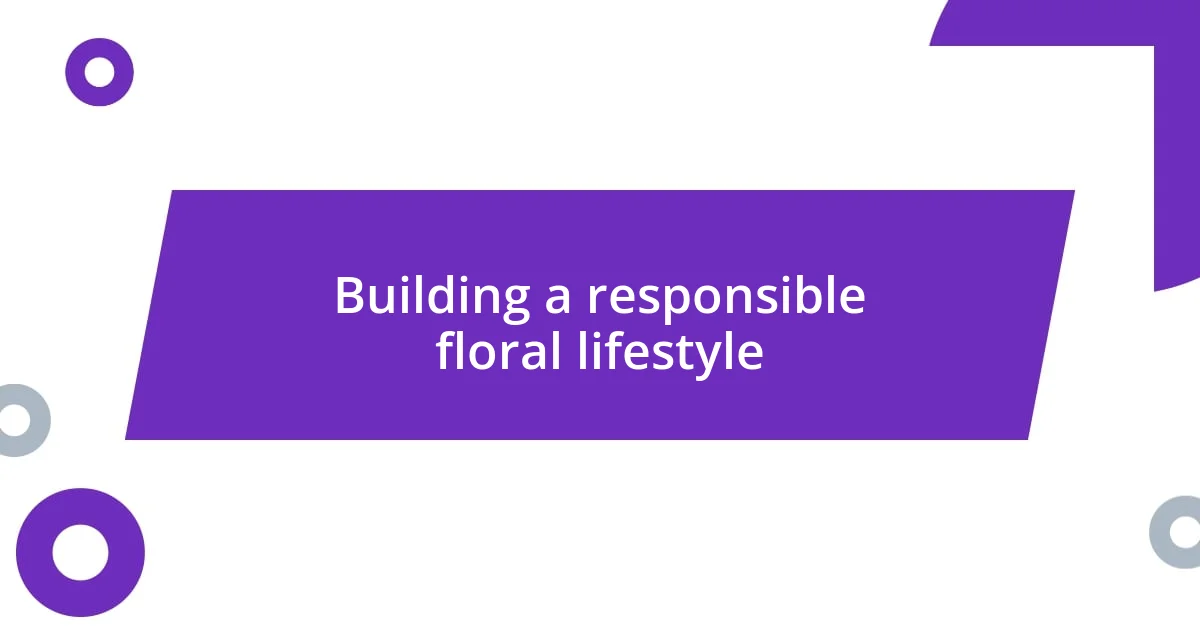
Building a responsible floral lifestyle
Being mindful of the environmental impact of my floral choices is essential to my responsible floral lifestyle. I vividly remember a few years back when I learned about the harmful effects of imported flowers that require extensive travel and often come with excessive pesticides. It felt eye-opening to realize that by opting for locally grown blooms, not only was I supporting my community but also reducing my carbon footprint. Have you ever considered how your flowers travel before they reach your vase?
Another aspect that enriches my approach is embracing the concept of flower preservation. I recall gifting a dear friend a beautiful arrangement for her birthday, and when the blooms began to wilt, I suggested we press the flowers together. It turned into an art project that deepened our friendship and served as a beautiful reminder of a special day. In my experience, finding creative ways to extend the life of our floral gifts reinforces our connection to nature and the memories those flowers represent. Isn’t it fascinating how a simple act of preservation can transform our relationship with flowers?
Lastly, I find joy in cultivating my own flower garden, even if it’s just a small window box. Watching the seeds I planted sprout is incredibly rewarding and connects me to the cycle of nature. The first time I saw a bud blossom, I felt a sense of triumph and gratitude for the earth’s beauty. Have you thought of growing your own flowers? Each bloom nurtured with care represents a token of love, a commitment to sustainability, and serves as a constant reminder of the beauty that surrounds us.


